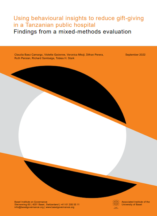Previous research has shown that social norms of gift-giving and reciprocity are linked to patterns of bribery in the Tanzanian health sector. Health facility staff that do not accept a gift or reciprocate a favour are often punished by means of gossip, criticism, and even social isolation, further enforcing the norms. On the other hand, gift-giving and bribery exacerbate inequality in access to healthcare, as patients who are able and willing to give gifts might receive preferential treatment at the expense of those who cannot afford them. At the extreme, gifts and other unofficial payments become a requirement for access to services, with life threatening consequences for the most vulnerable groups.
In this mixed-methods evaluation we aimed to understand the feasibility and potential impact of a multi-component behavioural intervention on rates of gift exchange between users and staff of a public regional referral hospital in Dar es Salaam, Tanzania. The intervention aimed to shift users’ (ie patients and individuals accompanying them to the health facility) and health providers’ attitudes and perceived social norms around gift-giving, and to reduce actual exchange of gifts (ie the behaviour).



